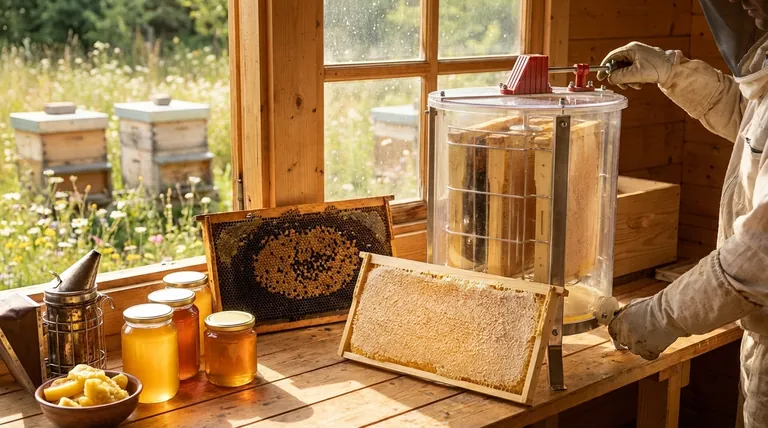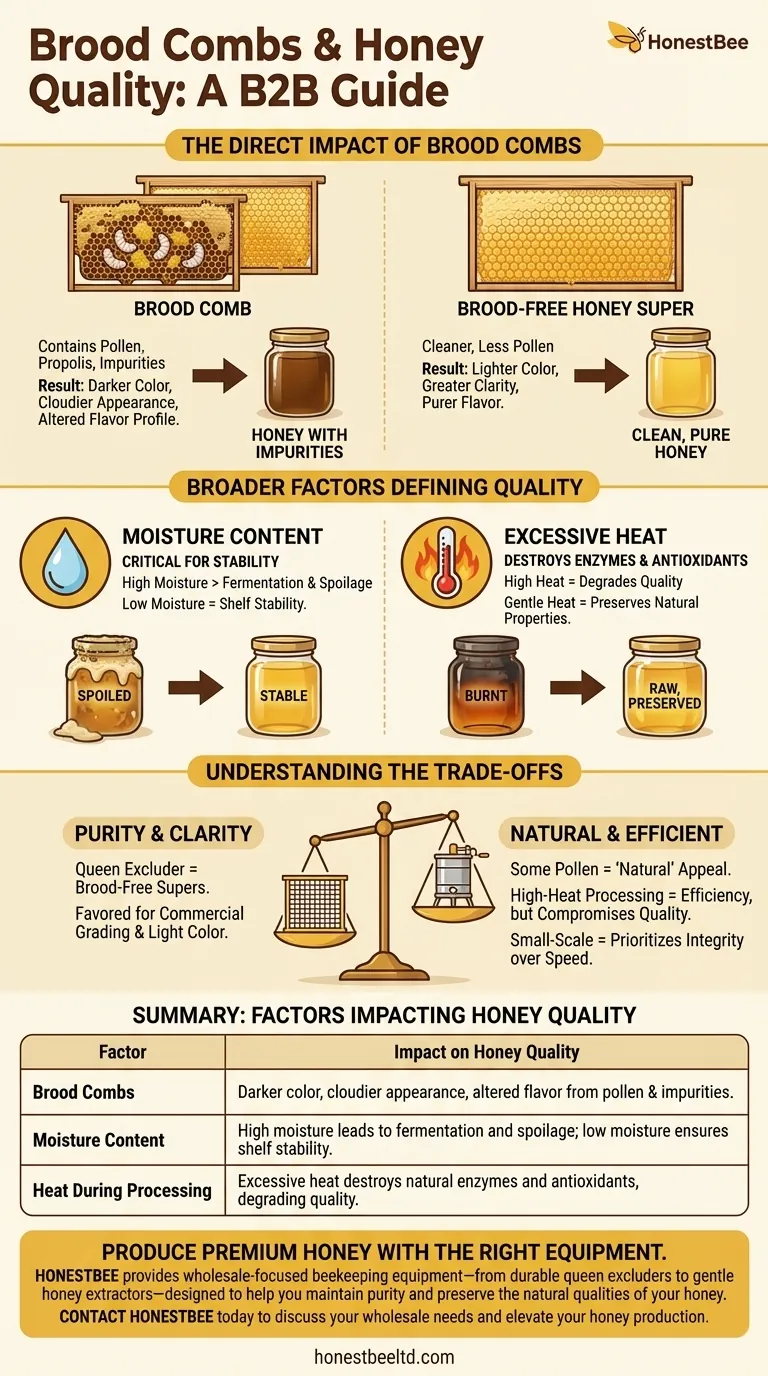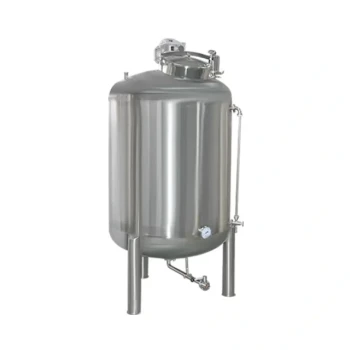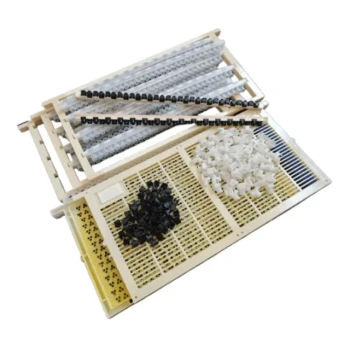In short, yes—the presence of brood combs directly affects the quality of honey. Honey extracted from combs that have been used to raise bee larvae will contain a higher concentration of pollen and other impurities. This can result in a darker color, cloudier appearance, and a potentially altered flavor profile compared to honey from pristine, brood-free combs.
While harvesting from brood-free combs is a best practice for cleaner honey, the most significant factors that degrade honey quality are improper moisture levels and excessive heat during processing, which can destroy its natural enzymes and antioxidants.

The Direct Impact of Brood Combs
The primary function of brood combs is to house developing bees and store pollen—the bees' protein source. Honey stored in and around these cells inevitably picks up some of this material.
Introduction of Pollen and Impurities
Brood combs are rich with stored pollen and may contain propolis, larval casings, and other hive materials. When honey is extracted from these frames, these elements are mixed into the final product.
By contrast, honey extracted from frames that have been kept separate from the brood chamber will be naturally cleaner and contain far less pollen.
Effect on Color and Clarity
The increased particulate matter, especially pollen, will almost always darken the honey and make it less transparent. While this is not inherently a sign of "bad" honey, commercial grading and consumer preference often favor lighter, clearer honey.
Broader Factors Defining Honey Quality
The influence of brood combs is just one piece of the puzzle. Two other factors have a far more significant impact on the final quality of your honey: moisture and heat.
The Critical Role of Moisture Content
Moisture content is a crucial parameter for honey stability. Honey with high water content is susceptible to fermentation, where yeasts begin to spoil the product, giving it a sour taste.
Properly cured honey in the hive has a low moisture level that makes it shelf-stable indefinitely. Harvesting honey before the bees have fully cured it can lead to this problem.
The Threat of Excessive Heat
Heat is the enemy of raw, natural honey. While warming honey can make it easier to extract and can help reduce moisture content, high temperatures degrade its quality.
Processing honey at temperatures significantly above that of a natural beehive destroys beneficial enzymes and antioxidants, stripping it of its unique health properties.
Preserving the Natural Constitution
The goal of quality-focused processing is to preserve the honey's natural state as much as possible. This involves using gentle, even heat—just enough to soften crystallized honey for extraction without "cooking" it. This approach maintains the freshness and beneficial compounds that make honey a valuable food.
Understanding the Trade-offs
Making decisions in beekeeping and honey processing often involves balancing purity with practicality.
Purity vs. A "Natural" Product
For a commercial operation aiming for a high grade, pollen is considered an impurity to be minimized. Beekeepers achieve this by using a queen excluder—a screen that prevents the queen from laying eggs in the honey supers, thus ensuring they remain brood-free.
However, some honey enthusiasts seek out honey with a high pollen count for its perceived nutritional benefits and unique local flavor profile. In this context, pollen is a feature, not a flaw.
Efficiency vs. Quality
Large-scale honey producers often use high heat to quickly liquefy honey and filter it aggressively for a perfectly clear, uniform product. While efficient, this process can compromise the very qualities that define premium, raw honey.
A small-scale beekeeper can prioritize quality over speed, using minimal heat and gentle handling to preserve the honey's integrity, even if it comes from combs that once held brood.
Making the Right Choice for Your Goal
Ultimately, the importance of using brood-free combs depends on your final objective.
- If your primary focus is maximum clarity and light color: Harvest exclusively from brood-free honey supers, using a queen excluder to keep them pristine.
- If your primary focus is preserving natural enzymes: Prioritize gentle, low-temperature extraction and processing methods above all else.
- If your primary focus is preventing spoilage: Ensure the honey's moisture content is low enough to prevent fermentation, as this is the most critical factor for shelf stability.
Producing exceptional honey is a balance between clean harvesting practices and gentle processing that respects the product's natural state.
Summary Table:
| Factor | Impact on Honey Quality |
|---|---|
| Brood Combs | Darker color, cloudier appearance, altered flavor from pollen & impurities. |
| Moisture Content | High moisture leads to fermentation and spoilage; low moisture ensures shelf stability. |
| Heat During Processing | Excessive heat destroys natural enzymes and antioxidants, degrading quality. |
Produce Premium Honey with the Right Equipment
Whether you're a commercial apiary or a beekeeping equipment distributor, achieving consistent honey quality requires reliable supplies. HONESTBEE provides wholesale-focused beekeeping equipment—from durable queen excluders to gentle honey extractors—designed to help you maintain purity and preserve the natural qualities of your honey.
Contact HONESTBEE today to discuss your wholesale needs and elevate your honey production.
Visual Guide

Related Products
- HONESTBEE 3-Frame Manual Acrylic Honey Extractor
- 6 Frame Manual Stainless Steel Honey Extractor Beekeeping Equipment
- Plastic Hand Crank 2 Frame Honey Extractor Low Price
- Stainless Steel 3 Frame Manual Honey Extractor Spinner for Bee Honey Extraction
- electric honey extractor honey centrifuge 3 frame honey extractor stainless steel honey frame extractor
People Also Ask
- What is the pressing method for extracting honey? A Simple, Low-Cost Approach for Small-Scale Beekeepers
- What machines are needed in beekeeping besides basic tools? Scale Your Honey Harvest Efficiently
- What is the most common method for cleaning a honey extractor? Protect Your Honey & Equipment
- How to extract honey by hand? A Guide to Crush & Strain vs. Manual Extractors
- What is the principal idea in harvesting honey? A 3-Step Guide to a Responsible Harvest



















